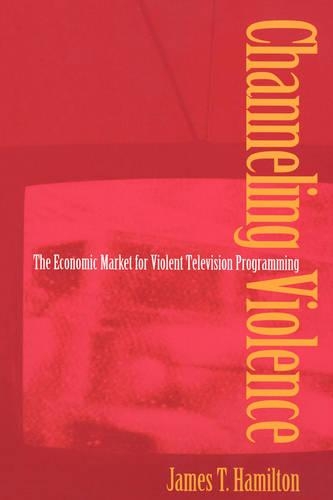
Channeling Violence: The Economic Market for Violent Television Programming
(Paperback)
Publishing Details
Channeling Violence: The Economic Market for Violent Television Programming
By (Author) James T. Hamilton
Princeton University Press
Princeton University Press
27th November 2000
United States
Classifications
Professional and Scholarly
Non Fiction
Media studies
Violence and abuse in society
Economic theory and philosophy
302.2345
Winner of Goldsmith Book Prize 1999
Physical Properties
Paperback
390
Width 152mm, Height 235mm
595g
Description
"If it bleeds, it leads." The phrase captures television news directors' famed preference for opening newscasts with the most violent stories they can find. And what is true for news is often true for entertainment programming, where violence is used as a product to attract both viewers and sponsors. In this book, James Hamilton presents the first major theoretical and empirical examination of the market for television violence. Hamilton approaches television violence in the same way that other economists approach the problem of pollution: that is, as an example of market failure. He argues that television violence, like pollution, generates negative externalities, defined as costs borne by others than those involved in the production activity. Broadcasters seeking to attract viewers may not fully bear the costs to society of their violent programming, if those costs include such factors as increased levels of aggression and crime in society. Hamilton goes on to say that the comparison to pollution remains relevant when considering how to deal with the problem.Approaches devised to control violent programming, such as restricting it to certain times and rating programs according to the violence they contain, have parallels in zoning and education policies designed to protect the environment. Hamilton examines in detail the microstructure of incentives that operate at every level of television broadcasting, from programming and advertising to viewer behavior, so that remedies can be devised to reduce violent programming without restricting broadcasters' right to compete.
Reviews
Winner of the 1999 Goldsmith Book Prize, Joan Shorenstein Center on the Press, Politics, and Public Policy at the JFK School of Government, Harvard University "This well-written and finely argued analysis begins by noting what we all-too-often take for granted: TV programming is in general profit driven, and, in particular, is strategically chosen to attract particular viewing audiences... Hamilton, effectively and adroitly, makes the analogy to air pollution in that in both cases producers do not consider the full societal and cultural costs of their activities."--Journalism and Mass Communication Quarterly "Drawing on economic theory and a wealth of empirical evidence, in addition to his previous complementary professional research on pollution control, Hamilton ... contributes significantly to the literature on television violence and the individual and societal stake in it... The book offers a wealth of data... Recommended."--Choice
Author Bio
James T. Hamilton is Assistant Professor of Public Policy and Economics at Duke University.
